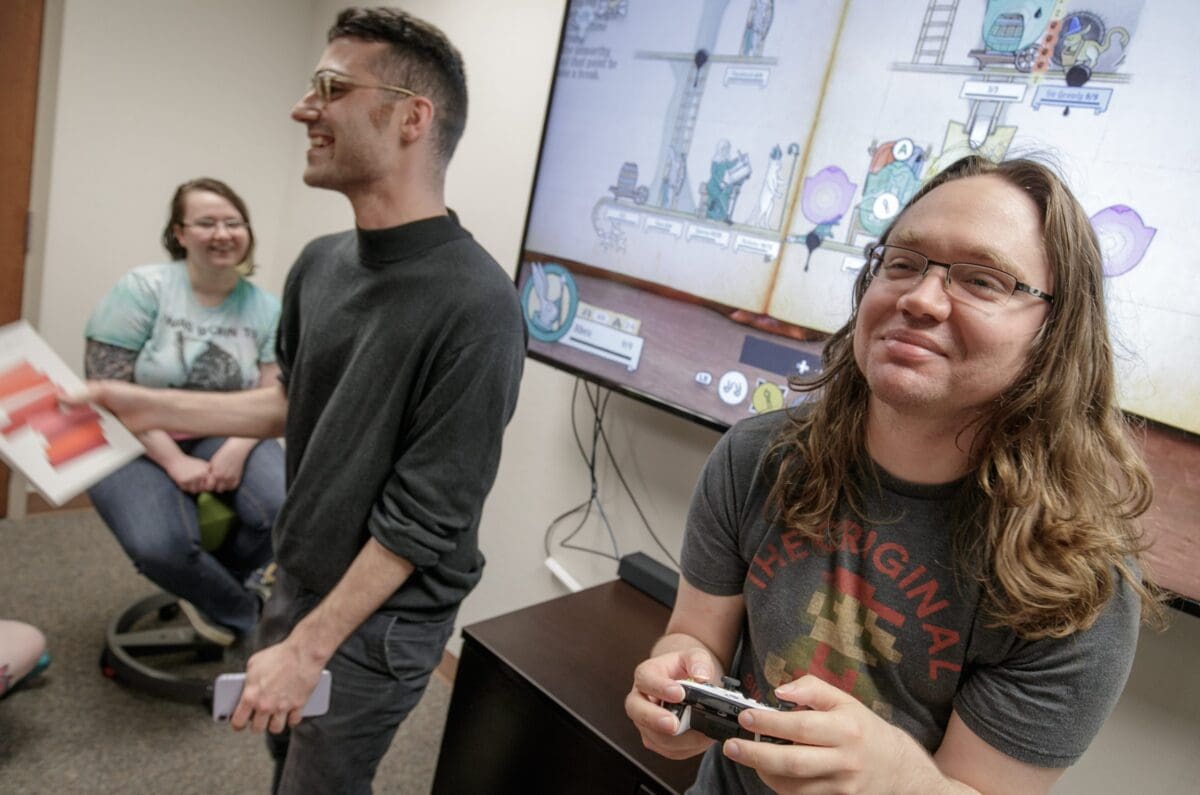UA Little Rock’s Inclusive Gaming Club Back in Action

During a lively Wednesday afternoon on campus, a group of UA Little Rock students, faculty, and alumni who have a passion for gaming gathered to play.
They started out with Townscraper, where users construct an island town by placing and removing colored blocks on an ocean. They next perused options like “It Takes Two,” “Unpacking,” and “Goat Simulator,” before deciding on medieval-themed “Inkulinati.”
After choosing Alewife, who is described as a “strong woman in these difficult times,” as their main character, the group quickly decided to change her name to Qwerty. Dr. Joe Williams, a professor of rhetoric and writing, commented that it can take the group a full hour to decide on the character alone.
While nobody seems to understand the purpose of the game in the beginning, they dig the “Monty Python” vibe of the game. This is a scene from UA Little Rock’s Inclusive Gaming Club, a place where people can play video games, hang out, and discuss diversity and representation in gaming.
“The primary purpose of the club is to give students a place to play games in a low-stakes, comfortable environment,” said Dr. Londie Martin, associate professor of rhetoric and writing and faculty advisor of the Inclusive Gaming Club. “We want to use this space to build community and give students and anyone on campus who is interested a place to have conversations about video games. We see video games not just as games, but as important cultural artifacts that we can learn from.”
After a strong start in 2018, Martin said the club lapsed during the COVID-19 pandemic, when classes went online and groups could no longer meet in person. Now the Inclusive Gaming Club is back in action, meeting once a month, and looking to regain momentum.
Martin said she was inspired to start the Inclusive Gaming Club after she felt left out by many of the mainstream games as a child.
“I’ve been gaming since I was a little kid back in the days when you rented games from Blockbuster,” Martin said. “When games shifted to first-person shooter games, it seemed like it wasn’t as open to me as a girl. When I got to college, I started to discover more indie games where there was more diversity. I found a gaming community, and it made me feel like gaming was open to everyone.”
Connor Pearce, a December 2022 graduate, said he joined the club to learn more about diverse video games.
“I studied video games a lot in graduate school,” Pearce said. “I care about the language that is used in games and the representation of games. This is a fun space to just enjoy playing video games and talking about them. You can talk about how games can be more inclusive to more types of people who don’t normally play, as well as the concerns of how different underrepresented groups are portrayed in game narratives.”
The Department of Rhetoric and Writing is full of students and faculty with a love of gaming. Williams, a faculty advisor to the Inclusive Gaming Club and co-founder of the Little Rock Game Designers Group, teaches courses like video game writing and game creation. The department regularly participates in the Global Game Jam, where teams create games in one fast-paced weekend. Prior to the pandemic, the Inclusive Gaming Club held a 24-hour live streamed gaming event where members played games to raise money for Lucie’s Place, a nonprofit that helps LGBTQ+ young adults who are experiencing homelessness.
“This club combines a lot of faculty and student interests, including gaming, social critique, and inclusivity, and it opens us up to exploring different media and modalities,” said Dr. Joyce Carter, chair of the Department of Rhetoric and Writing. “We are exploring the role of games and gamification. Games are hands on, and they can create educational opportunities.”
She points to the video game, “To The Rescue,” as a successful example of how games can help educate people. Two UA Little Rock graduates, Olivia Dunlap and Tanner Marshall, created the dog rescue shelter simulation game as students to help raise money and awareness for animal shelters.
“Games help us make connections across the university, and this is the kind of club that crosses departments and majors and builds community among faculty, students, and alumni,” Carter said.
If you are interested in learning more about the Inclusive Gaming Club, contact Professor Martin at [email protected].
